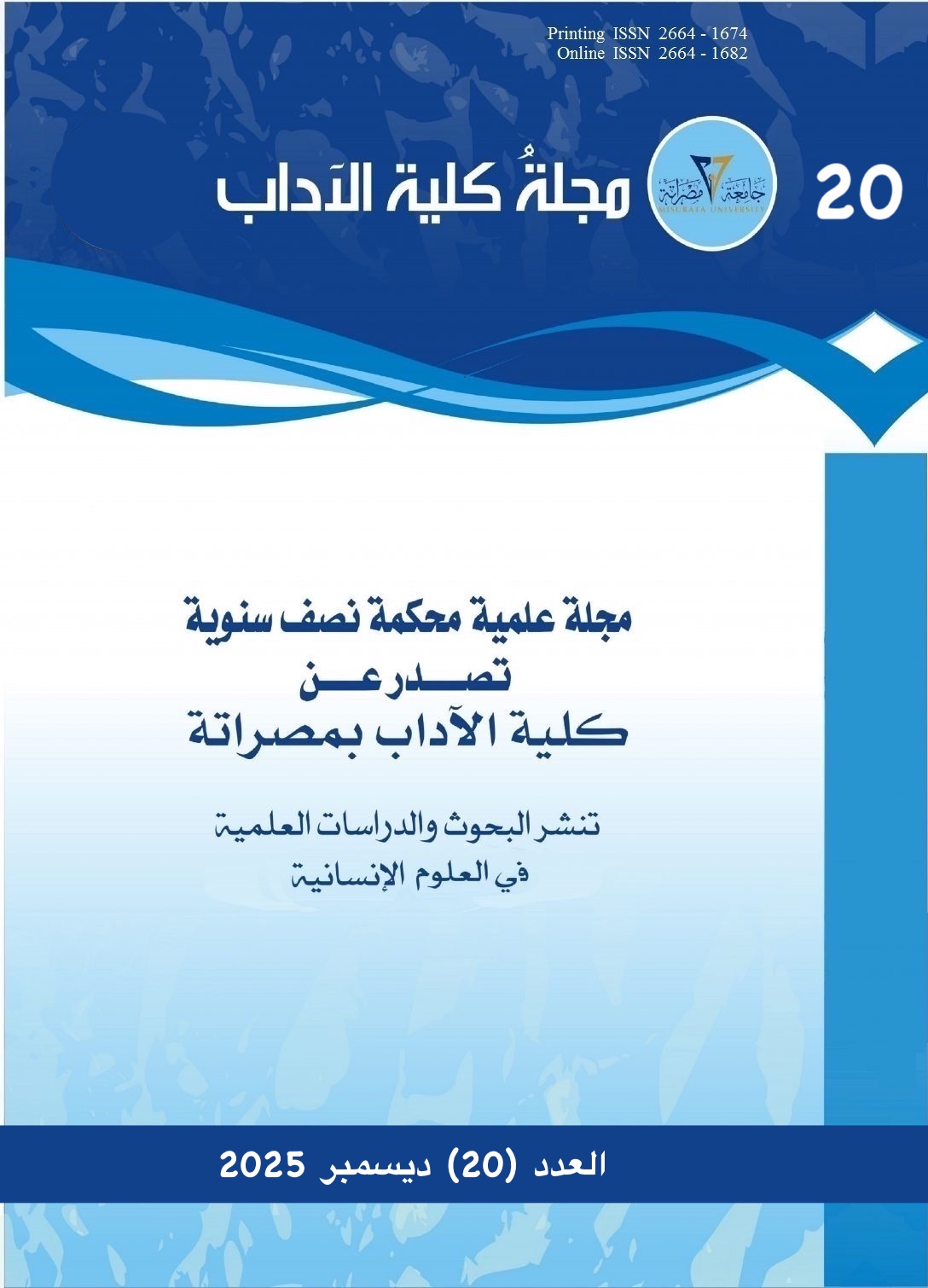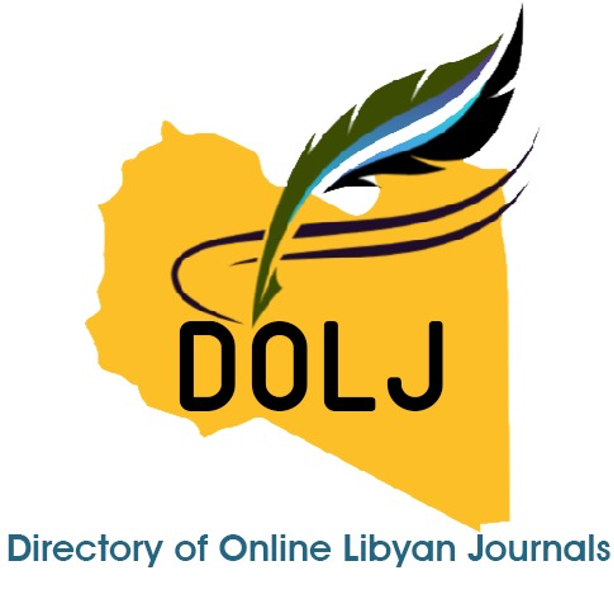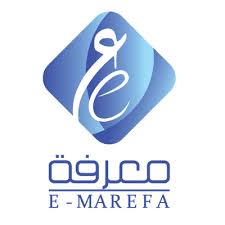أثر التغذية الراجعة البنّاءة في تعزيز الكفاءة الذاتية للتحدث لدى طلبة قسم اللغة الإنجليزية بكلية الآداب – جامعة مصراتة
DOI:
https://doi.org/10.36602/faj.2025.n20.08الكلمات المفتاحية:
التغذية الراجعة الشفهية ، الثقة بالنفس ، التغذية الراجعة البناءة ، الاستعداد العاطفيالملخص
تهدف هذه الدراسة إلى فهم كيفية تأثير التغذية الراجعة البناءة الشفوية على ثقة الطلاب الناطقين باللغة الإنجليزية في أنفسهم، وذلك بين طلاب قسم اللغة الإنجليزية بكلية الآداب، جامعة مصراتة. تبحث هذه الدراسة في تأثير جوانب مختلفة من التغذية الراجعة البناءة، وخاصة الوضوح، والنغمة، والتوقيت، والعرض، على رغبة الطلاب في المشاركة في أنشطة التحدث داخل الفصل. تم تطبيق أساليب مختلطة في هذه الورقة، بما في ذلك استجابات لاستبيان من 41 طالبًا في اللغة الإنجليزية ومقابلات شبه منظمة مع 12 مشاركًا. أظهرت النتائج أن الطلاب يفضلون التغذية الراجعة الإيجابية، لكنهم يفضلون التعليقات الواضحة والشخصية التي تهدف إلى توجيه تقدمهم. ساعدت التغذية الراجعة الواضحة والمشجعة في تعزيز ثقة الطلاب في التحدث، بينما كانت المعلومات أو التعليقات غير الواضحة التي تمت مشاركتها بشكل مفتوح تؤدي عادةً إلى نتائج عكسية. أثر مستوى الاستعداد العاطفي للطلاب على كيفية تلقيهم للتغذية الراجعة وتصرفهم بناءً عليها. وفقًا للدراسة، يجب على معلمي اللغة الإنجليزية كلغة أجنبية التركيز على تصحيح الأخطاء ودعم مشاعر المتعلمين. وتقترح الدراسة اعتماد تقنيات تغذية راجعة أكثر استجابة لدعم اعتقاد الطلاب في قدرتهم على التحدث في الفصول الدراسية الليبية.
المراجع
Abukhattala, I. (2015). The use of technology in language classrooms in Libya. International Journal of Social Science and Humanity, 6(4), 262–267. DOI: https://doi.org/10.7763/IJSSH.2016.V6.655
Asswail, S. E. (2020). An investigation into the challenges EFL Libyan university students encounter in English speaking classroom [Doctoral dissertation]. University of Zawia.
Au, H. Y. C., & Bardakçı, M. (2020). An analysis of the effect of peer and teacher feedback on EFL learners’ oral performances and speaking self-efficacy levels. International Online Journal of Education and Teaching, 7(4), 1453–1468. https://files.eric.ed.gov/fulltext/EJ1271038.pdf
Bandura, A., 1977. Self-Efficacy: The exercise of control. W.H. Freeman and Company. New York.
Bandura, A. (1977). Self-efficacy: Toward a unifying theory of behavioral change. Psychological Review, 84(2), 191-215 DOI: https://doi.org/10.1037//0033-295X.84.2.191
Brown, H. D. (2007). Principles of language learning and teaching (5th Ed.). New York: Longman
Derakhshan, A., Khalili, A. N., & Beheshti, F. (2016). Developing speaking skills through task-based instruction in Iranian EFL classrooms. International Journal of English Linguistics, 6(2), 54–63. DOI: https://doi.org/10.5539/ells.v6n2p177
Elabbar, A. (2011). An investigation of influences affecting Libyan English as a foreign language university teachers’ conceptions and practices of classroom feedback. (Doctoral dissertation, University of Exeter).
Ellis, R. (2009). Corrective feedback and teacher development. L2 Journal, 1(1), 3-18. DOI: https://doi.org/10.5070/L2.V1I1.9054
El-Jeadi, F. B., Benrabha, A. A. M., & Rubiaee, A. A. M. (2023). The lack of teacher student interaction in libyan efl classroom. Al-Tarbawi Journal, 22, 45–72. University of Al-Merqab, Faculty of Education, Alkhums.
Elsaadi, N. M., & Aqila, M. (2023). Identifying the factors that affect the oral participation among EFL Libyan understudy learners at the department of English, Sirte University. Sirte University Journal of Humanities, 13(2), 247–256. DOI: https://doi.org/10.37375/sujh.v13i2.2455
Hossain, K. I., Ahmed, M. K., & Mahmud, M. S. (2024). A comprehensive review on the impact on teacher feedback in language development for ESL/EFL learners. IUBAT Review, 7(1), 218–229. DOI: https://doi.org/10.3329/iubatr.v7i1.74421
Hattie, J., & Timperley, H. (2007). The power of feedback. review of educational research, 77(1), 81-112. DOI: https://doi.org/10.3102/003465430298487
Khalid, K. A. A. (2021). A study in English speaking skills among the university students in south Libya. Journal of Human Sciences, 20(4), 61–65. DOI: https://doi.org/10.51984/johs.v21i4.2266
Maharani, R. (2022). The correlation between EFL students’ self-efficacy and their speaking ability. RETAIN: Journal of Research in English Language Teaching, 10(01), 156-163.
Nasution, F. S., & Nissa, K. (2024). Investigating students’ level of self-efficacy in speaking performance of Thai EFL learners. ESTEEM Journal, 7(2), 311–323. DOI: https://doi.org/10.31851/esteem.v7i2.14966
Orafi, S. M. S., & Borg, S. (2009). Intentions and realities in implementing communicative curriculum reform. System, 37(2), 243–253. DOI: https://doi.org/10.1016/j.system.2008.11.004
Owhda, A. A. M. (2023). Developing Libyan Students’ Speaking Skills: Problems and Solutions. Human and Community Studies Journal, 20(4), 1-10.
Rao, S. P. (2019). The importance of speaking skills in English classrooms. Alford Council of International English & Literature Journal, 2, 6-18.
Smith, J., & Johnson, L. (2023). Effective feedback techniques for professional growth. Journal of Communication, 15(2), 45-60.
Sotlikova, R. (2023). Students’ attitude towards teacher feedback: A case study of Uzbekistan EFL learners. Asian Journal of Assessment in Teaching and Learning, 13(1), 59–66. DOI: https://doi.org/10.37134/ajatel.vol13.1.7.2023
Tawir, K. M. O., & Baharum, H. I. B. (2024). Factors affecting low English-speaking proficiency among secondary school EFL learners in Libya: Scoping review. International Journal of Academic Research in Progressive Education and Development, 13(4), 2160–2175. DOI: https://doi.org/10.6007/IJARPED/v13-i4/23810
Wang, C., & Sun, T. (2020). Relationship between self-efficacy and language proficiency: A meta-analysis. System, 95, 102366. DOI: https://doi.org/10.1016/j.system.2020.102366
التنزيلات
منشور
كيفية الاقتباس
إصدار
القسم
الرخصة
الحقوق الفكرية (c) 2025 خليفة محمد شنينة، نسرين بوشعيب بوالهنى

هذا العمل مرخص بموجب Creative Commons Attribution 4.0 International License.
جميع الأعمال المنشورة في هذه المجلة مرخّصة بموجب رخصة المشاع الإبداعي – النَسب 4.0 الدولية (CC BY 4.0)، والتي تتيح استخدام المحتوى، ومشاركته، وتعديله، وإعادة توزيعه لأي غرض، بما في ذلك الأغراض التجارية، شريطة الإشارة المناسبة إلى المؤلف الأصلي والمصدر، وتوفير رابط للترخيص، وبيان ما إذا كانت قد طرأت تعديلات على العمل

















